| Srl | Item |
| 1 |
ID:
047901
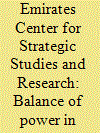

|
|
|
|
|
| Publication |
Abu Dhabi, Emirates Center for Strategic Studies and Research, 2000.
|
| Description |
x, 138p.
|
| Standard Number |
0863722822
|
|
|
|
|
|
|
|
|
|
|
|
Copies: C:1/I:0,R:0,Q:0
Circulation
| Accession# | Call# | Current Location | Status | Policy | Location |
| 043746 | 327.1120954/EMI 043746 | Main | On Shelf | General | |
|
|
|
|
| 2 |
ID:
060832
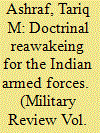

|
|
|
|
|
| Publication |
Nov-Dec 2004.
|
|
|
|
|
|
|
|
|
|
|
|
|
|
|
|
| 3 |
ID:
122129
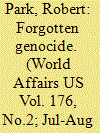

|
|
|
|
|
| Publication |
2013.
|
| Summary/Abstract |
North Korea's nuclear weapons test on February 12th was its third and most powerful to date. According to the Democratic People's Republic of Korea's state-controlled news agency, the test was carried out "using a miniaturized and lighter nuclear device with greater explosive force than previously." It was a wake-up call for some in the arms control community who have dismissed Pyongyang's nuclearization merely as a bargaining chip for monetary or material concessions and against regime change. The North Koreans are now playing in the big leagues, with a warhead small enough to be used on an intercontinental ballistic missile that, according to the regime, could potentially strike not only US bases in South Korea and Japan, but also Guam and the US mainland. Those who ritualistically condemned the test also ignored one of the issues that it was meant to obscure: while spending billions on its nuclear program, the Kim regime, in continuity with its dynastic predecessors, was also presiding over a state-induced famine and mass atrocities within its prison camp system that have taken on the proportions of a homemade genocide.
|
|
|
|
|
|
|
|
|
|
|
|
|
|
|
|
| 4 |
ID:
139852
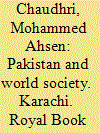

|
|
|
|
|
| Publication |
Karachi, Royal Book Company, 1987.
|
| Description |
xiv, 348p.hbk
|
| Standard Number |
9694070716
|
|
|
|
|
|
|
|
|
|
|
|
Copies: C:1/I:0,R:0,Q:0
Circulation
| Accession# | Call# | Current Location | Status | Policy | Location |
| 031760 | 954.9/CHA 031760 | Main | On Shelf | General | |
|
|
|
|
| 5 |
ID:
064301
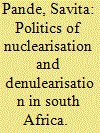

|
|
|
| 6 |
ID:
113265
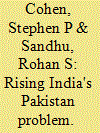

|
|
|
|
|
| Publication |
2010.
|
| Summary/Abstract |
This article identifies the persistent India-Pakistan rivalry as a paired minority conflict and argues that, as the predominant actor, India needs to shed its historical complexes and engage Pakistan proactively. By transcending its traditional reluctance, fears and prejudices, India must demonstrate that it can make use of its recently established economic and socio-political clout to be a dominant force in the region. A review of different scenarios for the future of Pakistan and possible Indian responses to another terrorist attack on Mumbai indicates that India's best option would be to evolve a multilevel and long-term 'carrot and stick' strategy towards its neighbour. Beyond ineffectual Track II dialogues, an excessive focus on Kashmir and myopic decisions determined by domestic contingencies, India needs to build the necessary trust and solve its Pakistan problem by focusing on deeper economic interdependence and sustained civil society contacts, and revive its nuclear disarmament plans.
|
|
|
|
|
|
|
|
|
|
|
|
|
|
|
|
| 7 |
ID:
065481


|
|
|
| 8 |
ID:
096041


|
|
|
|
|
| Publication |
2010.
|
| Summary/Abstract |
A plethora of theoretical perspectives have explained India and Pakistan's nuclearization. Such arguments, while partially correct, offer little that incorporates how the constitutive nature of states' identities explain their perceptions of (in)securities and nuclear policy choices. In this article, I offer an interpretive analysis of India and Pakistan's nuclear trajectory by exploring the representations of (and the connections between) their nationalist identities, perceptions of insecurities and nuclear policy choices. Following the critical constructivist premise, I argue that while India and Pakistan have justified their nuclear policies on the basis of certain geo-strategic (in)securities, the interpretation of what constitutes their national selves and (in) securities have been driven by their historical legacies, economic or developmental anxieties, and their political leaders' (or states') ideologies. Seen from this critical constructivist perspective, I particularly draw attention to a conjectural moment of South Asian politics, where, following India's nuclear detonation under the BJP in May 1998, the nuclear (in)security discourses of India and Pakistan have drawn from cultural re-articulations of their nationalist identities and (in)securities to justify their nuclear policies. I conclude by suggesting the need to engage realism (i.e. the material realm) with critical constructivism (i.e. the interpretive realm) to comprehend cultural productions of identities and (in)securities in inter-state politics.
|
|
|
|
|
|
|
|
|
|
|
|
|
|
|
|
| 9 |
ID:
086673


|
|
|
|
|
| Publication |
2009.
|
| Summary/Abstract |
The Asian-Pacific scene at present is marked by turbulent economic conditions and varying degrees of political instability, yet foreign relations are relatively favorable. Two key issues in Northeast Asia-North Korean nuclearization and cross-Taiwan Straits relations-remain unresolved, but current trends are generally hopeful. In Southeast and South Asia, conditions have been marked by economic decline stemming from the domestic scene and prominent cases of political tension. Yet, the risk of a war between Asian-Pacific states is at a record low.
|
|
|
|
|
|
|
|
|
|
|
|
|
|
|
|